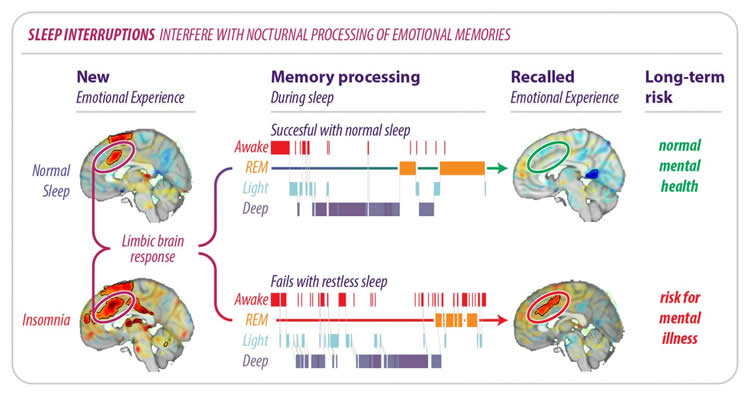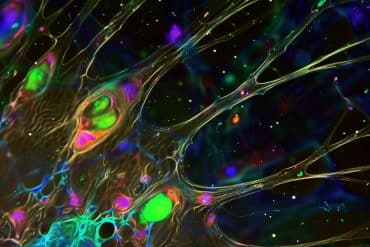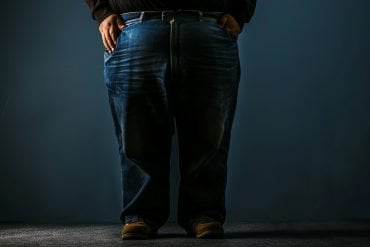Summary: For some, insomnia may be caused by failing to neutralize emotional distress. Researchers speculate the sleep disorder could be caused by brain circuits that regulate emotion.
Source: KNAW
Cringe-worthy mistakes and embarrassing blunders made today won’t seem so bad tomorrow. That is, unless you’re an insomniac, research at the Netherlands Institute for Neuroscience shows. The scientists asked participants to relive their most shameful experiences of decades ago while making MRI scans of their brain activity.
While good sleepers literally settled those experiences in their head as neutralized memories, people with insomnia were not able to do so.
This breakthrough finding suggests that insomnia could primarily be caused by a failing neutralization of emotional distress. Which makes it understandable that insomnia is the primary risk factor for the development of disorders of mood, anxiety, and posttraumatic stress.
The findings will be published on 25 April in the leading scientific journal Brain.
Maladaptive sleep
It is a well-known fact that sleep helps us to remember important experiences. But sleep is also essential for getting rid of the emotional distress that may have occurred during those experiences. Both these overnight processes involve changes in the connections between brain cells: some become stronger and consolidate memories, whereas others are weakened and get rid of unwanted associations.
“Sayings like ‘sleeping on it’ to ‘get things off your mind’ reflect our nocturnal digestion of daytime experiences. Brain research now shows that only good sleepers profit from sleep when it comes to shedding emotional tension. The process does not work well in people with insomnia. In fact, their restless nights can even make them feel worse” says first author Rick Wassing.
Karaoke
The new brain imaging findings explain a recent finding that the same research group has just published in the scientific journal Sleep.
In this study, they asked participants to sing along karaoke-style. Headphones prevented them from hearing their own voice and finding the correct pitch. Their singing was recorded and played back later.
Participants felt intense shame when listening to their own out-of-tune solo singing. But if they listened once more after a good night’s sleep, they didn’t feel that distressed about it anymore. They had literally got the distress off their minds.

At least: good sleepers did. After a restless night, people with insomnia were in fact even more upset about it.
Emotion
Scientists have been searching for causes of insomnia in brain areas that regulate sleep. The new findings show that causes of insomnia are probably rather found in brain circuits that regulate emotions. These circuits contain risk genes for insomnia and may not activate properly, as they normally do, during rapid eye movement sleep. Without the benefits of sound sleep, distressing events of decades ago continue to activate the emotional circuits of the brain as if they are happening right now.
Scientists Rick Wassing, Frans Schalkwijk and Eus van Someren thus show that people with insomnia are haunted by memories of past distress.
Source:
KNAW
Media Contacts:
Rick Wassing – KNAW
Image Source:
The image is credited to Rick Wassing.
Original Research: Open access.
“Haunted by the past: old emotions remain salient in insomnia disorder”
Rick Wassing, Frans Schalkwijk, Oti Lakbila-Kamal, Jennifer R Ramautar, Diederick Stoffers, Henri J M M Mutsaerts, Lucia M Talamini, Eus J W Van Someren. Brain. doi:10.1093/brain/awz089
Open access:
“Overnight worsening of emotional distress indicates maladaptive sleep in insomnia”
Rick Wassing, Jeroen S Benjamins, Lucia M Talamini, Frans Schalkwijk, Eus J W Van Someren. Sleep. doi:10.1093/sleep/zsy268
Abstract
Haunted by the past: old emotions remain salient in insomnia disorder
Studies suggest that sleep supports persistent changes in the neuronal representation of emotional experiences such that they are remembered better and less distressful when recalled than when they were first experienced. It is conceivable that sleep fragmentation by arousals, a key characteristic of insomnia disorder, could hamper the downregulation of distress. In this study, we sought further support for the idea that insomnia disorder may involve a lasting deficiency to downregulate emotional distress. We used functional MRI in insomnia disorder (n = 27) and normal sleepers (n = 30) to identify how brain activation differs between novel and relived self-conscious emotions. We evaluated whether brain activity elicited by reliving emotional memories from the distant past resembles the activity elicited by novel emotional experiences more in insomnia disorder than in normal sleepers. Limbic areas were activated during novel shameful experiences as compared to neutral experiences in both normal sleepers and insomnia disorder. In normal sleepers, reliving of shameful experiences from the past did not elicit a limbic response. In contrast, participants with insomnia disorder recruited overlapping parts of the limbic circuit, in particular the dorsal anterior cingulate cortex, during both new and relived shameful experiences. The differential activity patterns with new and old emotions in normal sleepers suggest that reactivation of the long-term memory trace does not recruit the limbic circuit. The overlap of activations in insomnia disorder is in line with the hypothesis that the disorder involves a deficiency to dissociate the limbic circuit from the emotional memory trace. Moreover, the findings provide further support for a role of the anterior cingulate cortex in insomnia.
Abstract
Overnight worsening of emotional distress indicates maladaptive sleep in insomnia
Study Objectives
Mechanisms underlying the distress of hyperarousal in people with insomnia remain enigmatic. We investigated whether insomnia impedes the overnight adaptation to emotional distress.
Methods
We induced the distressful self-conscious emotion of shame four times across three consecutive days by exposing 64 participants to their often embarrassingly out-of-tune singing, recorded earlier during a Karaoke session. Perceived physical, emotional, and social distress was assessed with the Experiential Shame Scale.
Results
Compared to exposures followed by wakefulness, exposures followed by sleep resulted in overnight relief of physical component of shame in normal sleepers, but in a striking opposite overnight worsening in people with insomnia.
Conclusions
Our findings are the first to experimentally show that the benefits of sleep are not only lost when sleep is poor; people with insomnia experience a maladaptive type of sleep that actually aggravates physically perceived distress. Maladaptive sleep could shed new light on posttraumatic stress disorder (PTSD) and on diurnal mood fluctuation and the counterintuitive favorable effects of sleep deprivation in depression.






